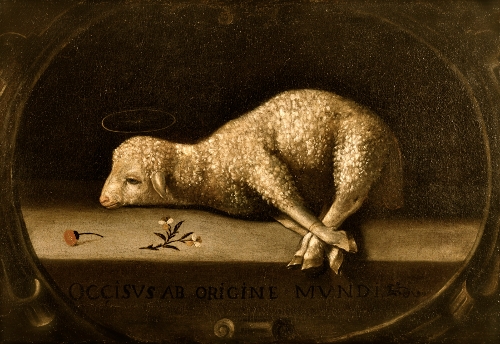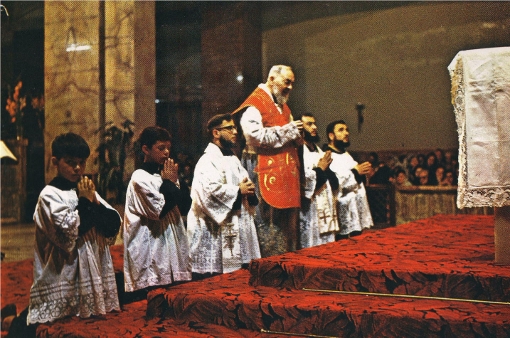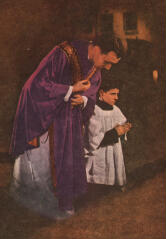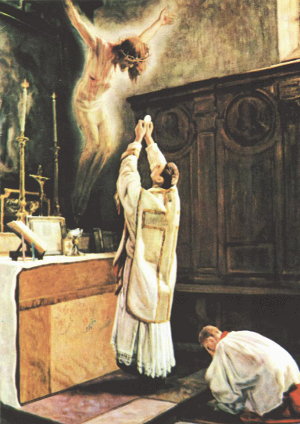
The theme of mercy was sounded right from the outset, in the Asperges: "Thou shalt sprinkle me, O Lord ... Thou shalt wash me, and I shall become whiter than snow."
This was followed immediately by the chanted Introit for today's Feast: "Dignus est Agnus, qui occisus est ..." The Lamb that was slain is worthy. Worthy to receive power and honor, and to receive our adoration and praise. Which Lamb? The One that was slain. No cheap grace here. Already that terrible theme of Sacrifice.

Meanwhile the priest and servers intone the Prayers at the Foot of the Altar, which carry their own mixture of joy and sadness: "I will go in unto the altar of God, to God Who giveth joy to my youth." God's judgment is then invoked, in order to distinguish ourselves from those who are not holy -- those who are unjust and deceitful and from whom we ask for deliverance. But then, immediately: "For Thou, O God, art my strength: why has Thou cast me off, and why do I go sorrowful whilst the enemy afflicteth me?" Then, finally: "Hope in God, for I will still give praise to Him ..."

Such a mixture of conflicting emotions in rapid succession! Why is it that I go in unto the altar of God, after all? Because the altar is a place of killing and death. But why does it "give joy to my youth"? Because it gives me hope of life. Why do I go about "sorrowful and afflicted by the enemy," and why would I ever say that God has "cast me off"? Because that is my condition when I succumb to the deceits of the Devil and allow myself to be afflicted by my Accusor. That (all of these reasons) is why I go in unto the altar of God, to church, to the Mass.
No unmixed giddy gladness here. By the same token, no unmixed doom and gloom.
 The message of the Mass rings true. The notes of hope speak to our aspirations without being romantically naive about the aberrations of our fallen nature. The notes of realism speak to our aberrations without being dismal or despairing about God's capacity to graciously redeem us.
The message of the Mass rings true. The notes of hope speak to our aspirations without being romantically naive about the aberrations of our fallen nature. The notes of realism speak to our aberrations without being dismal or despairing about God's capacity to graciously redeem us.
Next comes the Confiteor, as the servers and the priest, each in turn, confess their sinful unworthiness to almighty God and all the blessed in heaven, reminding us of our culpability before God. Ascending the altar, the priest continues this theme, beseeching God to take away our iniquities and forgive him his sins (and, perforce, our own).
The Gospel for the Feast of Christ the King is from John 18:33-37, where even the Kingship of our Lord is cloaked by His appearance before Pilate in the form of a prisoner. All earthly power in this context appears to belong to Pilate, the Roman governor of Palestine. Nothing must have looked more pathetic to
 Pilate than the response of Jesus to his question: "Art Thou a king then?" This poor "marginal Jew," standing humbly bound before him, replies that He is indeed a king, though his kingdom "is not of this world." No kidding. Yet as Jesus would later tell Pilate, he would have no power or authority over Him at all were it not given him "from above." Like the rest of the secular world, Pilate was oblivious to the source and locus of genuine power and authority in the very drama in which he took part.
Pilate than the response of Jesus to his question: "Art Thou a king then?" This poor "marginal Jew," standing humbly bound before him, replies that He is indeed a king, though his kingdom "is not of this world." No kidding. Yet as Jesus would later tell Pilate, he would have no power or authority over Him at all were it not given him "from above." Like the rest of the secular world, Pilate was oblivious to the source and locus of genuine power and authority in the very drama in which he took part.
From the incense rising above the altar at the beginning of the Mass to the moment of Consecration itself, every gesture of priest and server, every word in the Missal, points to the mystery of the Sacrifice. The largesse of God's mercy is there, certainly, overflowing in its amplitude. But it isn't an easy, happy-go-lucky sort of thing; and maybe that's why those who assist and participate in this liturgy aren't given to expressions of personal enthusiasm such as one finds in pentecostal-type services.
 There is something terrible about God's mercy. There is ample reason for joy, yes; and perhaps there is a sense in which that is even the primary note here; but it is no shallow happy-clappy thing, untempered by the sorrow of sacrifice.
There is something terrible about God's mercy. There is ample reason for joy, yes; and perhaps there is a sense in which that is even the primary note here; but it is no shallow happy-clappy thing, untempered by the sorrow of sacrifice.
For there could be no mercy or joy without sacrifice -- THE Sacrifice, His Sacrifice. And why was His Sacrifice necessary? Because of our own "grievous fault." Moreover, although the mercy and forgiveness and joy made possible by His Sacrifice is wholly unmerited, there is yet another sacrifice required here: our own. Christ the King does not ask only for our observance of Holy Days of obligation or our tithes and offerings. He asks for our very life: our whole self. Certainly there is joy in all of this, but also there is the sober realization that our passport to eternal life is our own death: our death to self. Discipleship means giving ourselves over to Christ, for Him to do with what He wants. It means slavery: becoming a slave to Christ.
A point of significant beauty in the liturgy is reached in the Offertory. In the English of the new rite, this is the part where the priest says: "Blessed are you, Lord, God of all creation ..." (a prayer adapted from the Jewish Passover Seder). In the traditional Latin rite of the Church, unfortunately, the opening prayer of the Offertory is often eclipsed by the activity of ushers taking up the Sunday collection. This is unfortunate in the extreme, because the prayer is one of the most beautiful in the Mass (in fact, it can be instructive to compare it with the Novus Ordo Offertory). It is beautiful in its clarity and simplicity about what is happening in the ritual: what is being offered and why. It is the part where the priest says: "Suscipe, sancte Pater ..." In English, it reads thus: "Receive, O holy Father, almighty, eternal God, this spotless host [= sacrificial victim] which I, thine unworthy servant, offer unto Thee, my living and true God, for my own countless sins, offenses, and negligences, and for all here present; as also for all faithful Christians, living or dead; that it may avail for my own and for their salvation unto life eternal."
This is where it all happens: Jesus is the unblemished Lamb of God, "this spotless host," who takes away the sins of the world. This is our source of joy and gladness. It is beautiful. Again, however, the beauty is tempered by the deep sadness of what has to transpire in order to achieve our salvation and eternal life: Jesus, "this spotless host," this innocent and pure Lamb without blemish, has to be killed and die. The wonder of it is that He does so willingly. For us, who are anything but innocent.

I remember a criticism once made by a Protestant friend after visiting a Catholic Mass: "The people don't seem to have any joy," he said. When I asked what he meant, he replied, "They aren't smiling. They don't look happy." Now it could be indeed that Catholics sometimes look the way they do because they aren't happy. It also could be that they have been reduced to creatures of habit, simply walking forward to receive the Eucharist without sufficient attention to Whom they are receiving. But it could also be because they understand what they are doing and because Catholic worship has Sacrifice at the very heart of it: a terrible mercy and a beautiful sadness.

7 comments:
"instead of trying so hard to follow everything in my Missal, I decided to just watch the unfolding drama."
Then your essay is your prayer, the fruit of your participation. Not actuosus enough for that pest Guardini, probably, but exactly what St Leonard of Port Maurice prescribed. He didn't like missals either.
Great job, Doc. Good, true, and beautiful. Kudos.
It reminds this reader just how how he has been abandoned and left in the dirtiest lowlands of the sheep gate by his shepherds to be, um, nourished by the Lil' Licit Liturgy
This is very beautiful, thank you for writing it. After the Asperges, which can on the right day bring tears to my eyes (...and I shall become whiter than snow? C'mon- heartbreaking!) I think the Kyrie affects me most. In my missal (in the sidebar) it is described as "the long cry of our wounded nature..." - in the Kyrie we are basically imploring Christ for mercy, which speaking for myself, I don't deserve.
As far as joy during Mass goes, salvation is a serious business. Protestants just don't, can't, understand. It's that simple.
Mary
I've always thought that the face of Michelangelo's Pieta expresses exactly the complex of emotions I reference in this post. The face is remarkable. The look is not one of despair or even simple sorrow. One cannot say that it expresses a lack of trust or faith in God. But there is nothing superficial or even simple about her emotions here. There is no wailing or outrage. Rather, one sees a seriousness (even a recollected wonder) about what has just happened: Our Lady's beloved Son -- God's own beloved Son -- has just been killed and lies dead in her lap.
Thanks for the reflection. You've captured a crucial element of the faith. A couple weeks ago the Dominicans at Holy Rosary, Portland presented a relic after mass for the faithful to kiss. I jumped in line just because everyone else did. As soon as I kissed the relic I started sobbing--both from a sense of beauty and sadness. Once I got back to the pew everyone was abuzz about the relic, 'What was it? What was it?' Finally one lady explained, 'It's a relic of Our Lady's veil.'
This is very moving, and seems to ring true to intuition.
It reminds me of my Protestant mother's observation that there has to be "something to" the Catholic crucifix versus the empty Cross, since we are "bought with a price." It also reminds me of a quote (I can't this minute track down) from John Senior's "Restoration of Christian Culture," where he remarks it may be no coincidence that the New Testament records no instance of Jesus' laughter.
There's a place for overtly joyous praise, but in contemplating the sacrifice of the Son, reverential fear and awe seem more in keeping with the larger story of "the long cry of our wounded nature" (love that!). That's why Graphic Ts hyping the Atonement always seem well-intentioned but severely off key.
We are reliving the passion of our Lord during Mass.We are supposed to be solemn, remorseful, begging forgiveness,and praying.Novus ordo protestant types do not understand.
Post a Comment